 Are processed foods really that bad for us?
Are processed foods really that bad for us?
And, what is considered a “processed food?”
We recently participated in a webinar hosted by an organization called Diet ID, where some industry experts discussed ultra-processed foods, including results from some recent studies.
You may be surprised by some of the insights they discovered and, with Diet ID’s permission, we wanted to share some of this with you!
What exactly are ultra-processed foods?
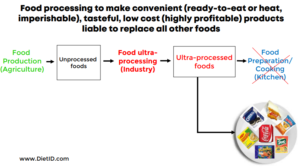 Twinkies, Cheetos, Pop-Tarts…these are obvious examples, right?
Twinkies, Cheetos, Pop-Tarts…these are obvious examples, right?
These foods have clearly been highly processed in a factory and beneficial nutrients are basically non-existent. Although, there are other highly processed foods that may not be so obvious (including certain cereals, yogurts, deli meats, soups, pasta sauces, salad dressings, frozen meals, flavored nuts and more).
Categories of Processing:
The NOVA food classification system (which is used by an increasing number of world health organizations) puts foods into four categories:
- Unprocessed and minimally processed (fresh, dried and frozen vegetables, grains, legumes, meat, fish, eggs and more).
- Processed culinary ingredients (oils, butter, sugar, salt and more).
- Processed foods (preserved fruits and vegetables, canned fish, cheese, fresh bread and more…usually made with a small number of ingredients).
- Ultra-processed foods (fast food, soft drinks, packaged snacks, chips, candy, cookies, cereals, sauces, dressings and more…usually made with a longer list of ingredients including flavorings, colorings, emulsifiers, sweeteners, thickeners and other substances).
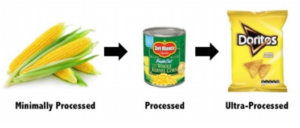 For example, using these categories, corn on the cob just harvested by the farmer is unprocessed. Once the corn is canned with preservatives, it would be considered a processed food. Then, once it is processed into Doritos, it has become an ultra-processed food.
For example, using these categories, corn on the cob just harvested by the farmer is unprocessed. Once the corn is canned with preservatives, it would be considered a processed food. Then, once it is processed into Doritos, it has become an ultra-processed food.
How prevalent are ultra-processed foods?
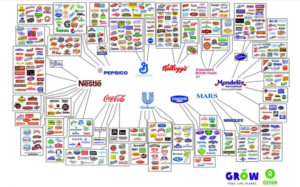 Maybe this won’t be a surprise, but studies have shown that the standard American diet includes significant amounts of ultra-processed food — almost 60% of daily calorie intake!
Maybe this won’t be a surprise, but studies have shown that the standard American diet includes significant amounts of ultra-processed food — almost 60% of daily calorie intake!
What’s fascinating is that there are relatively a small number of companies that control the majority of our food system, especially when it comes to ultra-processed foods.
These companies are among the largest advertisers in the world and spend BILLIONS of $ to market these products to consumers (kids and adults alike). They also spend huge amounts of money to make sure their foods are super-convenient (available everywhere), make sure customers will keep buying more (extremely addictive) and, of course, will be as profitable as possible (revenue > cost).
Do ultra-processed foods really affect our health?
Yes! There are many studies now that provide convincing evidence that these foods adversely affect our health. They increase the risk of chronic illnesses such as cardiovascular disease, diabetes and cancer. They contribute to becoming overweight or obese. They even increase the risk of depression.
Check this out!
A team led by the National Institute of Health recently conducted an interesting study.
- They took 20 people and secluded them in a controlled location for 28 days.
- Each person was given an unprocessed diet (categories 1-3 from the NOVA food classification system) for 2 weeks and an ultra-processed diet for 2 weeks. Some randomly did the unprocessed diet first, and then the ultra-processed diet (and the others did it in the reverse order).
- The meals were designed to be the same in terms of calories, carbs, fat, sugar, sodium and fiber. The participants were given 3 meals per day and were allowed to eat as much as they wanted at each meal. (So even though the same amount of calories was offered to everyone, how much they ate was up to each individual.)
- The ultra-processed foods may be surprising…they are foods that may be perceived as “not that bad for us” and could very easily sneak into our diets. In fact, before we started our REAL food journey, this looked a lot like our diet where we thought we were eating healthy! For example, Yoplait blueberry yogurt was part of the ultra-processed diet (vs. Fage plain Greek yogurt with frozen blueberries, which was part of the unprocessed diet). Here is a link to the daily menus for both diets.
The results?
 500 more calories! When participants ate the ultra-processed diet, they consumed 500 more calories per day vs. the unprocessed diet.
500 more calories! When participants ate the ultra-processed diet, they consumed 500 more calories per day vs. the unprocessed diet.
- Weight change! Participants gained about 2 pounds (on average) during their 2 weeks on the ultra-processed diet…and lost about 2 pounds during their 2 weeks on the unprocessed diet.
- Satisfaction was the same! Participants reported very little difference in hunger, fullness and satisfaction between the two diets (even though they consumed 500 fewer calories on the unprocessed diet).
- Still pleasant and familiar! Participants reported very little difference in the pleasantness and familiarity of the foods between the two diets.
 Not full yet! Interestingly, participants had a significantly faster eating rate on the ultra-processed diet vs. the unprocessed diet. Maybe this means it takes longer for people to feel full when eating ultra-processed foods?
Not full yet! Interestingly, participants had a significantly faster eating rate on the ultra-processed diet vs. the unprocessed diet. Maybe this means it takes longer for people to feel full when eating ultra-processed foods?
So, what is the takeaway?
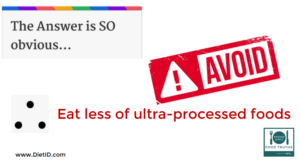 This will not be a shocker to the Eat REAL America community, but this just another example of why it is so important to keep it simple and EAT REAL!
This will not be a shocker to the Eat REAL America community, but this just another example of why it is so important to keep it simple and EAT REAL!
When you focus on REAL food, the ultra-processed foods just seem to disappear! Your cravings for those foods are replaced by cravings for flavor-loaded foods using REAL ingredients that grow from the ground, grow from a tree, graze on the prairie or swim in the ocean.
Plus, it is something anyone can do. Everyone can adapt it to their lifestyle, preferences, culture and other factors. No matter what your background, ethnicity, education or family dynamics, everyone has the opportunity to enjoy a wide variety of REAL food, including focusing on all the nutritious and delicious in-season ingredients.
Need a gift idea? Do you know someone who could benefit from a shift from ultra-processed foods to REAL food?
As we start looking forward to 2021 (and aren’t we all looking forward to new year?!), we encourage you to think about what you can do to help someone make a change…
 Give the gift of REAL food with a gift membership to www.EatRealAmerica.com!
Give the gift of REAL food with a gift membership to www.EatRealAmerica.com!
- Wrap up a copy of the Eat REAL Cookbook for that special someone to be inspired to kick of their 2021 with the 28 Day Kickstart!
- Give the experience of our comprehensive 8-module video program called Eat REAL For Your Health. This program sharpens shopping and cooking skills, so the whole family is reaching for and raving about REAL FOOD…every single day! This course not only includes the inspirational 8 core video modules but also an annual website membership for EatRealAmerica.com (can be added onto an existing membership) AND a copy of our Eat REAL Cookbook, including the 28-Day Kickstart!
Others have said, “This program has helped me tremendously with achieving my weight loss goals, and my family loves the food. I highly recommend it!”
it might just add years to their life and life to their years!
All images in this coaching tip are being used with permission from Diet ID. They were part of a webinar hosted in October 2020 titled “Ultraprocessed Foods: Implication for Nutrition Policy and Recommendations.” Diet ID is an organization that uses technology to help people improve their health (adding years to life and life to years) through better eating.
 LEARN MORE ABOUT THE NAPKIN!
LEARN MORE ABOUT THE NAPKIN!
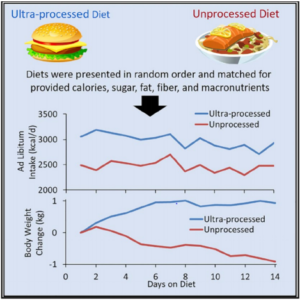
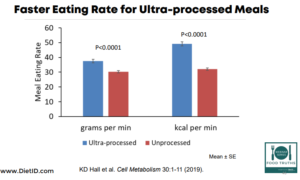
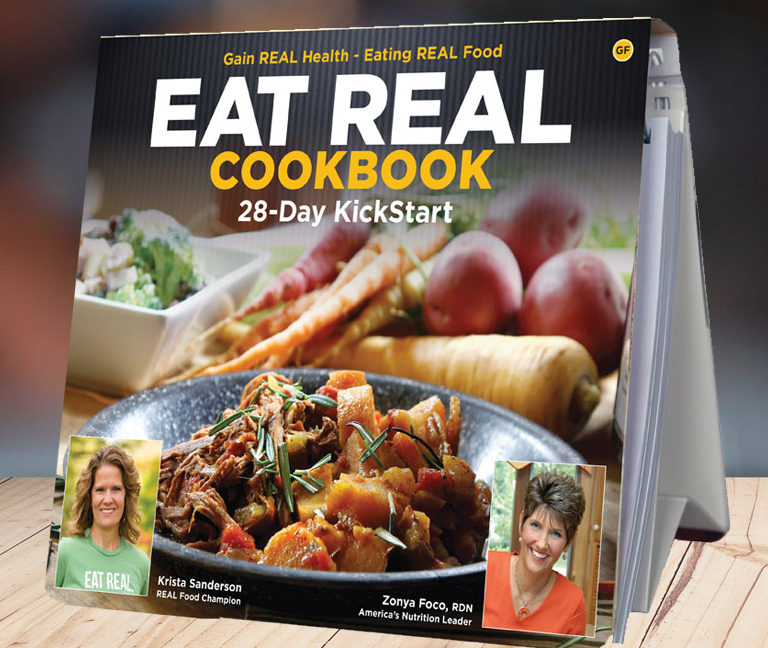

Great reminder. Can’t believe some of the things I used to eat. Not real food at all!
We can’t believe some of the things we ate too – kindof frightening now! Thank you so much for the feedback and so proud of you and the successes you are experiencing on your REAL food journey!